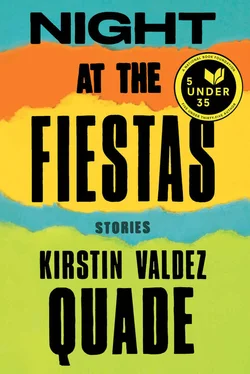THE NEXT SEVERAL DAYS were spent unpacking. At Carmen’s insistence, they dealt with the house room by room, beginning with the studio. “Lord,” said Carmen, hands on hips, as she stood in the doorway. “Looks like you had pigs rooting around in here.” Margaret watched with admiration as Carmen’s quick hands sorted her materials into piles, filled toolboxes and coffee cans and bookshelves, made it all manageable so that after only one morning the studio was ready.
“This is what I’m working on,” Margaret confided, turning a canvas that was facing the wall, the painting of the kitchen chair.
Carmen, crouched by the bookshelf, looked over her shoulder briefly. “What’s that chair doing on the beach?”
“It’s based on a myth—”
“It’s a pretty picture. Reminds me of when me and my sister went to San Diego, oh, ten, twelve years ago. I love the beach.” Sigh. “What would I give.”
MARGARET HAD BEEN UNEASY about getting rid of things from the old house when they’d moved, so she hadn’t, the result being that the more she and Carmen unpacked, the more claustrophobic she felt. The cornflower striped couch, the one she’d loved and which had looked so elegant and Colonial in Connecticut looked terrible here: fussy and wrong. So many of their things were like that.
“You must miss your husband,” said Carmen as she unwrapped the stemware.
“Of course it’s hard, but he has work there and I have my work here.” It wasn’t good for men to be on their own, Margaret knew that. They suffered without their wives, died earlier. In those same studies she’d read that married women were unhappier than those who lived alone.
Carmen looked at her, head tilted, questioning.
Her fury, this last year, had been as debilitating as her depression, and it was directed squarely at Harold — and why? Because he’d married her? Because they’d had a lovely girl together and their lives had been blessed, and he’d had a purpose while Margaret had drifted through it all? Margaret couldn’t articulate her fury, and Harold wouldn’t have known what to do with it even if she could.
Instead, night after night Margaret initiated in bed, and usually Harold responded, laughing, joking about her new insatiability. She demanded that he fuck her — said those words, though she never had before — and he did, his face serious and intent above her. She came in silent, anguished rage, and each time after, she cried — another thing she’d never done. Poor Harold was solicitous and baffled. He stroked her hair and asked what was wrong; had he been too rough, had he hurt her?
Carmen had moved on to the wedding china, wiping each piece with a dishcloth. “I have a set like this,” she said, holding up a plate. “It was a door prize at the Golden Mesa.”
“Oh,” said Margaret, deeply embarrassed for Carmen. She gassed up at the casinos; gas was cheaper there, and the restrooms always clean. Once, on an impulse, she’d pushed through the glass door that separated the convenience store from the casino itself. Inside it was dark, air thick with cigarette smoke, walls lined with mirrors reflecting the rows and rows of old people sitting before the blinking slots. Jangling manic sounds, frenetic lights, and, suspended from the ceiling, giant pots painted in the black and white geometrics of the Anasazi. Margaret had felt profoundly depressed, too depressed even to flee, until a skinny red-eyed man offered to buy her a drink. She’d shaken her head mutely and turned to go, grateful and disoriented when she stepped into the bright sunlight. It was all so tasteless, she’d told Harold later on the phone, such a misguided cheapening of culture.
“It seems like the casinos could cause a lot of social problems on the reservations,” Margaret ventured.
“Oh, I know,” said Carmen, tucking a strand of hair into her ponytail. “They’re getting so rich.” Sigh. “Oh, well. The slots relax me.” Carmen stood, pressing herself up on her thighs, then carried the stack of plates to the kitchen.
Margaret smiled brightly and sliced the packing tape on another box.
Why had she never noticed how much fabric she’d been surrounded by in her old life? The plush towels, the brocade and rugs, all the throw pillows and merino afghans, all meant to swaddle and muffle. And her clothes — heels, tailored jackets, stiff leather handbags — boxes and boxes of the stuff.
Carmen held a silk charmeuse blouse by the neck, displaying the label. “Ooh, Calvin Klein. Fancy lady.” Daisy nosed Carmen, who rolled her over with a palm and rubbed the soft pink belly.
“Take it.” Margaret examined then tossed aside a herringbone skirt. “I can’t believe I wore all this.”
“Are you sure?” Carmen asked about each item as she folded it neatly and set it behind her.
“God, yes! Take it all.” There was no way Carmen would fit into most of the clothes, but perhaps she would make them over.
Each day when Carmen left, she swung full garbage bags into the trunk of her dented Chrysler LeBaron, and each day Margaret felt lighter. It pleased Margaret to think of Carmen using her things. It must have felt like a windfall for her. Most of Margaret’s belongings weren’t cheap, were probably nicer than the things Carmen bought for herself. And perhaps she sold some of it, though Margaret didn’t care for that thought nearly as much.
In the end, Margaret kept a few of the ornate mahogany bureaus and side tables — family pieces — and the dining room set. Harold’s brown leather chair and about half the books. In the end, it was mostly her things she got rid of. All she wanted now were clean surfaces and straight lines, mental and creative space.
She packed Charlotte’s old drawings and school papers, ceramic frogs and elephants, spent a fortune to mail the box all the way to Johannesburg. Just last year, she’d sooner have died than part with these wobbly self-portraits and plaster handprints. Standing in line at the post office now, though, it felt essential to shed the weight of them. Charlotte would be wounded, but she was grown now, and Margaret was not, after all, an archive.
CARMEN’S TECHNIQUES WERE pleasingly old-fashioned: she cleaned with scalding water, bleach, white vinegar, wiped the windows with newspaper, scrubbed the kitchen floor with rags on her hands and knees. “Mops don’t do nothing,” she declared. “They just move the dirt around.”
She watched television while she worked. First the news programs, then the morning game shows. Soaps, talk shows. They worked their way through the day. Margaret found herself looking forward to some of the programs, talking about the personalities as though they were common acquaintances. “Bob Barker must be a million years old.”
“Oh,” said Carmen knowingly, “he’s had work. Just look at that neck.”
Of course, Margaret thought afterward, these television personalities were the only common acquaintances she and Carmen had.
If Margaret went for a walk, when she returned, the channel was often switched to a Spanish station, where women with bright makeup and clothes too sparkly and tight wept and ranted at surly, hard-jawed men. “Sorry,” Carmen would say and change it back to one of the English networks.
“No, no,” Margaret protested, but Carmen waved her away.
“It’s more fun if we can talk about it,” she said.
And talk Carmen did. Instead of painting, Margaret spent the mornings with her, sometimes paying bills, sometimes working alongside, sometimes just watching. Carmen’s own grandmother had been a traditional healer, a curandera .
“Oh, she was mean . The other kids were scared of her because she always wore black dresses down to here, and, my God, did she complain. She used to tell us stories to make us behave, about how La Llorona was going to go drown us in the river.” Carmen laughed. “Me and my brother ran away from her when she was watching us one night. We ran to our cousins’ and slept on their porch. All night on the porch, up against each other like puppies. Were we spanked when they found us!” She laughed and wiped her forehead with her arm, holding the wet rubber gloves over the sink so the water wouldn’t drip down her sleeves.
Читать дальше












